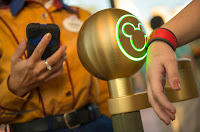 |
| Source: Fast Company |
But the cashflow aspect is only one aspect of Disney’s new service. When you begin to consider the potential of wearing a wireless ID around your wrist, all sorts of natural, customized interactions will become possible. Imagine a child meeting Mickey Mouse, and after sharing a warm hug, Mickey actually wishing them a happy birthday by name. There’s a digital handshake going on here, of course, but it’s totally imperceptible. All a child is left wondering is, “How did Mickey know me … and that it was my birthday?!?” Animatronics will see a similar personalization, so the otherwise obtuse talking robots can specifically acknowledge the people standing in front of them. At the same time, MagicBands enable a deeper level of data collection for Disney. They’ll be able to track someone through the entire park--to see their kingdom as a complex interaction model--finding trends in preferences and habits that can no doubt be monetized. Do people who meet Cinderella buy more princess apparel? Do those who eat the cheese fries for lunch go back to the hotel to take naps?
Talk about Big Data and Personalization all wrapped up into one incredible initiative! Immediately, one thinks about privacy issues, but Wilson points out that parents will be able to establish some privacy controls on the wristbands. The bigger issue is how Disney uses the wristbands. I think that the real opportunity here lies in focusing first on enhancing the guest experience. If this new tool can make the guests enjoy their stay even more, then the money will follow. People will spend more if they are more engaged and more satisfied with the experience, and if the wristbands can be used to minimize some of the guest's typical problems at the park (consider how mobile apps have helped people find rides with the shortest wait times). If the experience is enhanced, guests will stay longer at the park, interact with characters and exhibits in a more meaningful way, and avoid some of the frustrations that they typically encounter at the park. When that occurs, the improved profits will come.
1 comment:
The benefits to Disney in terms of big data collection are obvious. They can now track the behavior of every family 24x7 from when they enter a Disney property to when they leave.
I think this level of automation takes away from the Disney experience. At some point, when we all become RFID lookups, the fun of Disney is lost. I'd rather have my kids' favorite Disney characters ask them their name, introduce themselves and make some small talk rather than recite something off a hidden LCD screen networked through RFID readers and such.
Even when considering Disney's other business practices -- creating movie characters that can be leveraged across theme parks, stores, television, cruises, etc. It feels as if Disney is not making a movie so people can enjoy it with their kids. Rather its making a movie as a vehicle to sell you all kinds of junk for the next few years. For anyone that saw Cars 2, what I am talking about would be obvious. It was a formulaic movie designed to get a pre-teen boy audience watching and buying merchandise, story be damned.
There is a tipping point when the Magic Kingdom becomes the Magic Merchandising Kingdom driven by Big Data. I think Disney is rapidly reaching it.
Post a Comment